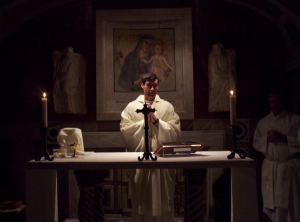‘I am the living bread which has come down from heaven; whoever eats of this bread will live forever. The bread I shall give is my flesh for the life of the world.’ (Jn 6:51)
These immortal words of our saviour, Jesus Christ, lay down the basis of the Eucharist, a reality that is difficult to believe unless we have faith. Indeed, ‘The first announcement of the Eucharist divided the disciples, just as the announcement of the Passion scandalised them: “This is a hard saying; who can listen to it?” The Eucharist and the Cross are stumbling blocks. It is the same mystery and it never ceases to be an occasion of division. “Will you also go away?”: the Lord’s question echoes through the ages, as a loving invitation to discover that only he has “the words of eternal life” and that to receive in faith the gift of his Eucharist is to receive the Lord himself.’ (CCC 1336)
To receive the Eucharist is to receive the Lord himself – what a truly amazing experience this is, and one that that has been passed down to us from Jesus through the Apostles. Through the Gospels of Matthew, Mark and Luke, and the letters of St Paul, the account of the institution of the Eucharist has been handed down through the centuries and is now very familiar to us: ‘While they were eating, Jesus took bread, blessed and broke it, and gave it to them. And he said, “Take this, it is my body.” Then he took a cup and after he had given thanks, passed it to them and they all drank from it. And he said, “This is my blood, the blood of the Covenant, which is to be poured out for many.’ (Mk 14: 22-24)
This celebration of the Eucharist, or Mass, is a memorial of Jesus’ death and resurrection, the broken and bloodied body that died for us on the cross, and was raised again on the third day. But the Eucharist is more than just a memorial or symbol of Christ’s passion and death. Through the words of consecration, given to us by the apostles, and the invocation of the Holy Spirit, the bread and wine we offer at Mass are changed into the body and blood of our Lord Jesus Christ! This is called transubstantiation.
This is the reason that the Eucharist, the sacrament of all sacraments, was so scandalous to the apostles at first, and can only be believed through faith. Through faith – given to us by God – we realise that we consume Jesus in this sacrament. Without it, we see only what is there in front of us, the appearance of bread and wine. This too sets us apart from other Christian denominations – we, and our Orthodox counterparts, are the only ones who have a Eucharistic faith. Having established that in this sacrament of the Eucharist we receive Christ himself it is important to understand how this sacrament should be approached, especially as the Church encourages us to receive Communion regularly.
We must always approach Mass with a proper disposition and due reverence. We must never receive Christ in the Eucharist unless we are in a state of grace. If we are not in a state of grace we must make use of the sacrament of Reconciliation and be absolved of our mortal sins first. St Paul explains: ‘Whoever, therefore, eats the bread or drinks the cup of the Lord in an unworthy manner will be guilty of profaning the body and blood of the Lord. Let a man examine himself, and so eat of the bread and drink of the cup. For anyone who eats and drinks without discerning the body eats and drinks judgement upon himself.’ (1 Cor 11:27-29)
If we truly believe that Jesus is present sacramentally then we must show him both reverence and respect. Therefore we should bow or genuflect before we receive him in the Eucharist. Some believers chose to receive him whilst they are kneeling, or receive him directly to their tongue instead of the priest placing him in their hands. These too are signs of reverence also – though not compulsory – and the second way of reception prevents particles of Jesus falling into our hands and never making it into our mouths. We must also ensure that we observe the fast – one hour prior to reception of Communion. It is through this reception of the Eucharist, as well as remembering Christ’s Passion and resurrection, we are united with Christ and anticipate eternal life with him.
The Eucharist is “the source and summit of the Christian life.” “The other sacraments, and indeed all ecclesiastical ministries and works of the apostolate, are bound up with the Eucharist and are orientated toward it. For in the blessed Eucharist is contained the whole spiritual good of the Church, namely Christ himself, our Pasch.”.’ (Catechism of the Catholic Church 1324)
First published in In Sight Magazine
Originally posted 2014-10-28 22:02:39.

